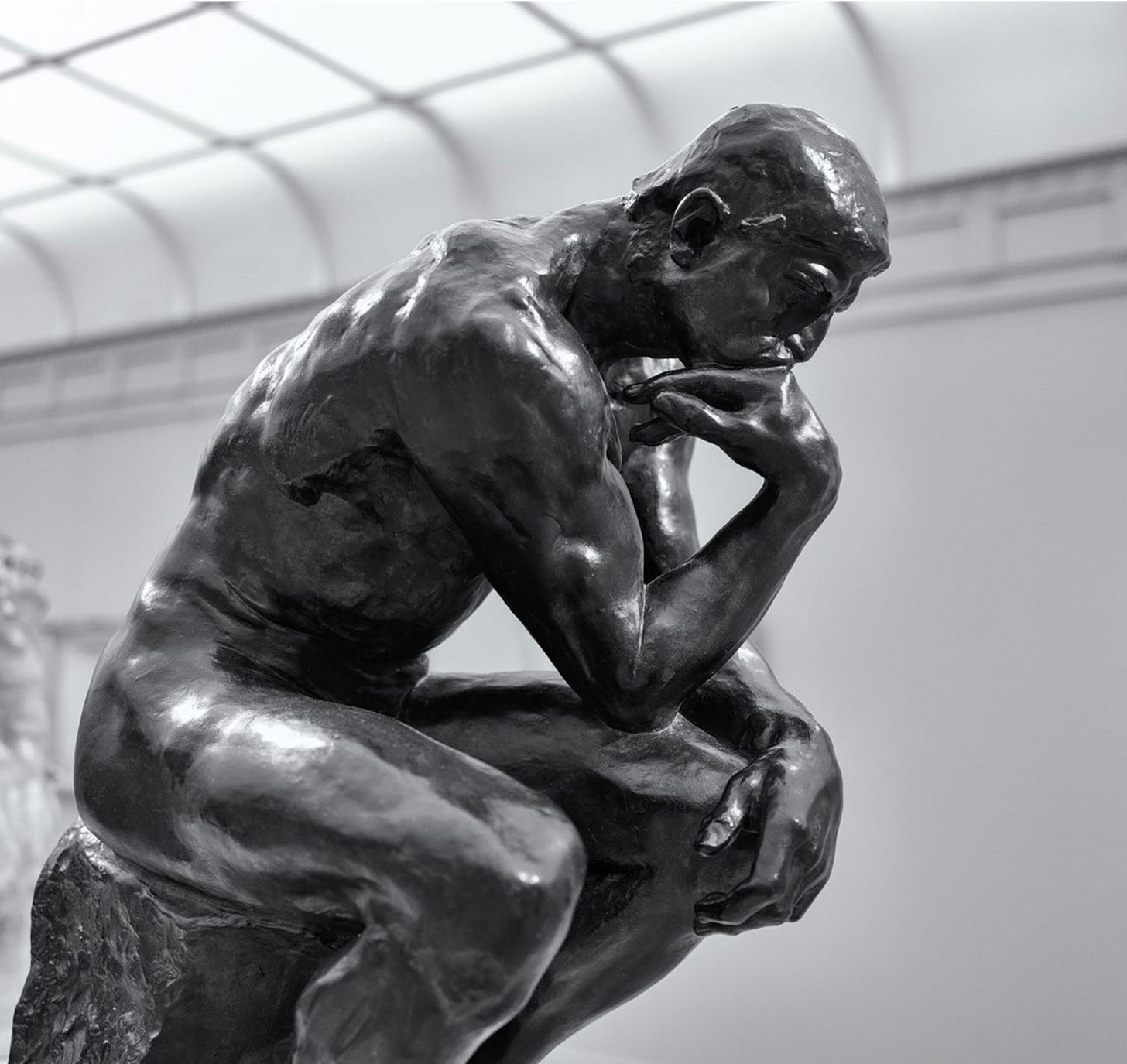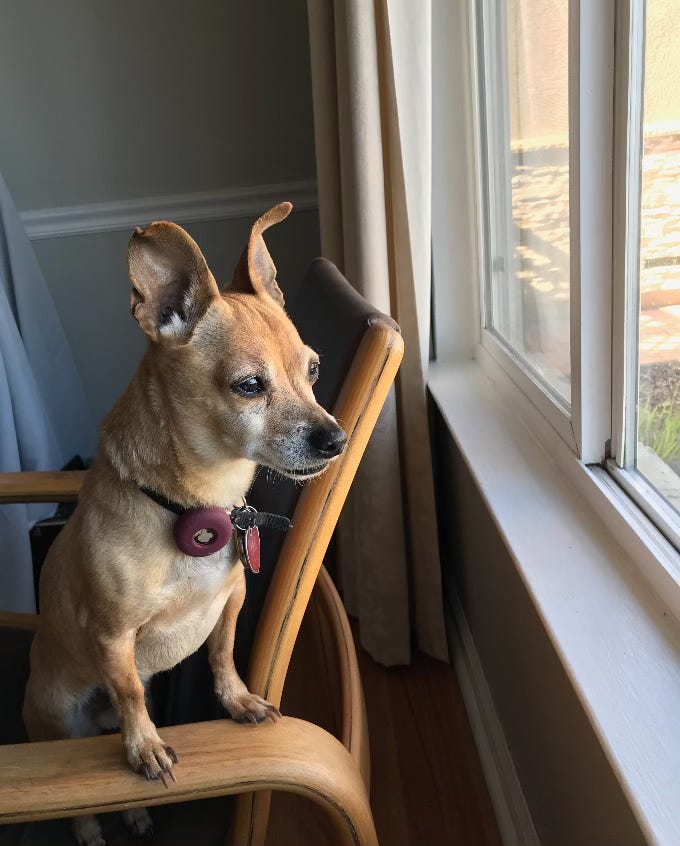3 Simple Ways to Free Yourself from Overthinking
Improve focus, foster self-awareness, and find peace in the present
Dear friends,
Welcome to another edition of Beyond Self Improvement! Last Wednesday, I published Thinking Something Positive About Someone? Tell them.
Today’s essay is about learning to navigate our minds with grace and find freedom from the oppressiveness of compulsive thinking. If you’re new, please join our growing community and get my next essay in your inbox by subscribing below:
Our minds are wired to analyze, compare, and define, making overthinking a common struggle. This tendency, often a quest for certainty in an uncertain world, needs unpacking.
Here's what we'll explore:
A lesson from Aesop's fable.
The varied challenges of compulsive thinking.
Personal stories on its impact.
The cycle of thoughts and emotions.
Types of overthinking and their effects.
These insights will help you improve focus, foster self-awareness, and find present-moment peace, leading to a more fulfilling life.
𑁍
In Aesop’s fable, a fox with many escape plans is caught in danger due to indecision, while a cat with one strategy survives. This mirrors our overthinking minds, trapped by complexity, versus the clarity of focused thought.
Overthinking leads to analysis paralysis, where action becomes elusive. We lose present moments to hypotheticals, clouded by indecision and self-doubt. Interestingly, age influences overthinking: the young often focus on the future, while the older dwell on the past.
In my twenties, a friend's question about gum led to an insightful joke about my tendency to overthink. One friend asked, “I wonder what happens to all the gum in the world?” “That’s an interesting question,” I replied. “Gotcha!” said my friend. “You know what your problem is, Ryan,” said the other friend. “You think too much.” Similarly, Thai monk Buddhadasa described the world succinctly as "Lost in thought," reflecting our collective mental state.
Attempts to get to the end of thinking or distract ourselves with TV, phones, or alcohol offer temporary escapes but don't break the cycle of thoughts and emotions. From personal experiences and discussions, it's clear these methods fall short of addressing deeper patterns.
Compulsive thinking takes many forms: ruminating on past mistakes, worrying about future uncertainties, fretting over others' opinions, fearing making wrong choices, and engaging in negative self-talk. These patterns distance us from the present and fuel emotional turmoil.
Eckhart Tolle’s insight that "Emotions are the energy of the body responding to the mind's activity" illuminates the cyclical dance between our thoughts and feelings. Acknowledging these patterns is the first step toward liberation.
𑁍
The solution lies in awareness-building practices like mindfulness, conscious breathing, and journaling.
Mindfulness. Mindfulness transforms our relationship with thoughts. It invites us into the present, revealing the joy of stillness and reducing the allure of overthinking. A 30% reduction in anxiety and depression symptoms, as reported in 'Psychiatry Research,’ points to its effectiveness. Yet, its beauty lies in simplicity—mindfulness can be practiced anytime, anywhere. Whether waiting in line, stuck in traffic, or feeling the water during a shower, these moments are opportunities for paying attention. Awareness teaches us to witness our thoughts and emotions without entanglement, allowing them to pass like clouds in the sky.
Conscious Breathing. Breathing consciously brings us back to the present, soothing the mind. The 4-7-8 technique is a testament to breathing's power to disrupt the cycle of compulsive thinking. Inhaling deeply for 4 seconds, holding for 7, and exhaling for 8 can significantly reduce stress levels. This simple practice, accessible anytime, is the quickest way to ease and stillness amidst the storm of thoughts.
Journaling. Journaling offers a rare glimpse into the workings of our minds, providing clarity and peace. Expressive writing has been shown to alleviate mental distress and bolster well-being. It's a practice of introspection, revealing our thought patterns and emotional landscapes. Allocating a few minutes daily to jot down thoughts, feelings, and experiences can illuminate the path to peace and understanding. When grappling with decisions, writing fosters perspective, transforming confusion into clarity.
𑁍
The path to overcoming overthinking is not about silencing the mind but learning to coexist peacefully with our thoughts. By practicing mindfulness, engaging in conscious breathing, and reflecting through journaling, we can gracefully navigate our mental landscape and find serenity amidst chaos.
Let's draw inspiration from Aesop's fable and the wisdom of awareness to forge a new relationship with our minds—one marked by peace, presence, and fulfillment. Each day presents an opportunity to practice living wakefully.
Keep returning to the present,
Ryan
P.S.… If you’re enjoying Beyond Self Improvement, will you take 6 seconds and forward this edition to a friend? It goes a long way in helping me grow the newsletter (and bring more and more Conscious Beings into the world).
And I’d love your input on how I can make Beyond Self Improvement even more useful for you! So please comment with:
Ideas you’d like covered in future editions
Your biggest takeaway from this edition
I read and reply to every comment!
And finally, whenever you’re ready, I can help you transform chronic anxiety and overwhelm into ongoing peace—making you feel calm and in control of your life. Schedule a free, 30-minute discovery call now.




Great article! Curious about your thoughts on journaling. A friend got me started with 1 page a day, but I have been writing eligibly as I fear if someone read it they would think I was crazy! I sort of use it as a brain dump but also a way to solve problems.
This is coming at a perfect time. I have to get out of the loop. Somehow I've convinced myself I'm superior because I can "see all angles"...when really I just end up ruminating on every possible outcome, paralyzed by indecision worried that I'll make the wrong (uninformed, subjective, unaware, etc. etc.) choice. Thanks for the reminder stay in the present and trust my intuition that exists in that moment.